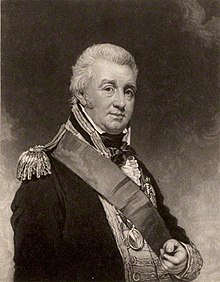Sir Alexander Forrester Inglis Cochrane
| Sir Alexander Inglis Cochrane | |
|---|---|

Sir Alexander Cochrane
|
|
| Born |
23 April 1758 Scotland, Great Britain |
| Died | 26 January 1832 (aged 73) Paris, France |
| Allegiance |
|
| Service/branch |
|
| Rank | Admiral |
| Commands held |
Leeward Islands Station Jamaica Station North American Station Plymouth Command |
| Battles/wars |
|
| Awards | Knight Grand Cross of the Order of the Bath |
Sir Alexander Inglis Cochrane GCB RN (23 April 1758 – 26 January 1832, born Alexander Forrester Cochrane) was a senior Royal Navy commander during the Napoleonic Wars and achieved the rank of Admiral. He was knighted for his service.
Alexander Inglis Cochrane was born a younger son of the Scottish peer Thomas Cochrane, the eighth Earl of Dundonald, and his wife. He joined the Royal Navy as a boy and served with British naval forces in North America. He served during the American War of Independence.
Cochrane also participated in the Egyptian operations in 1801. When Alexandria fell, Cochrane, in the 74-gun third-rate HMS Ajax, with the sixth-rate HMS Bonne Citoyenne, the HMS Cynthia, the brig-sloops HMS Port Mahon and HMS Victorieuse, and three Turkish corvettes, were the first vessels to enter the harbour.
About 1802/3 Cochrane alienated the Spanish Governor of Ferrol when Cochrane incited an attack on Spanish treasure ships returning from South America,. The effect of Cochrane's actions was to bring Spain back into the war on France side in 1804.
Cochrane also had been incensed that the brilliant Sir Edward Pellew, a tarpaulin officer, had been preferred over himself, a well connected aristocrat, as Admiral of the White to the East Indies station. Cochrane tried to implicate Sir Edward Pellew, who had good relations with the Governor of Ferrol, in fraud, then making seriously damaging and unfounded allegations against Sir Edward Pellew's secretary Fitzgerald. These were never substantiated and destroyed Fitzgerald's career but didn't accomplish the destruction of its target, who later became Viscount Exmouth.
...
Wikipedia
